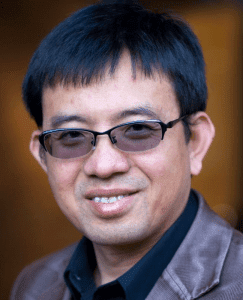 Friday, May 19, 2017, 9:00 – 11:30 am, Talk Room 2
Friday, May 19, 2017, 9:00 – 11:30 am, Talk Room 2
Organizers: Zhong-lin Lu, The Ohio State University and Susana Chung, University of California, Berkeley
Speakers: Zhong-lin Lu, Gordon Legge, Irving Biederman, Anirvan Nandy, Rachel Millin, Zili Liu, and Susana Chung
Professor Bosco S. Tjan was murdered at the pinnacle of a flourishing academic career on December 2, 2016. The vision science and cognitive neuroscience community lost a brilliant scientist and incisive commentator. I will briefly introduce Bosco’s life and career, and his contributions to vision science and cognitive neuroscience.
Bosco Tjan: An ideal scientific role model
Zhong-Lin Lu, The Ohio State University
Professor Bosco S. Tjan was murdered at the pinnacle of a flourishing academic career on December 2, 2016. The vision science and cognitive neuroscience community lost a brilliant scientist and incisive commentator. I will briefly introduce Bosco’s life and career, and his contributions to vision science and cognitive neuroscience.
Bosco Tjan: A Mentor’s Perspective on Ideal Observers and an Ideal Student
Gordon Legge, University of Minnesota
I will share my perspective on Bosco’s early history in vision science, focusing on his interest in the theoretical framework of ideal observers. I will discuss examples from his work on 3D object recognition, letter recognition and reading.
Bosco Tjan: The Contributions to Our Understanding of Higher Level Vision Made by an Engineer in Psychologist’s Clothing
Irving Biederman, University of Southern California
Bosco maintained a long-standing interest in shape recognition. In an extensive series of collaborations, he provided invaluable input and guidance to research: a) assessing the nature of the representation of faces, b) applying ideal observer and reverse correlation methodologies to understanding face recognition, c) exploring what the defining operations for the localization of LOC, the region critical for shape recognition, were actually reflecting, and d) key contributions to the design and functioning of USC’s Dornsife Imaging Center for Cognitive Neuroscience.
Bosco Tjan: A Beautiful Mind
Anirvan Nandy, Salk Institute for Biological Studies
Bosco was fascinated with the phenomenon of visual crowding – our striking inability to recognize objects in clutter, especially in the peripheral visual fields. Bosco realized that the study of crowding provided an unique window into the study of object recognition, since crowding represents a “natural breakdown” of the object recognition system that we otherwise take for granted. I will talk about a parsimonious theory that Bosco & I had proposed and which aimed to unify several disparate aspects of crowding within a common framework.
Bosco’s insightful approach to fMRI
Rachel Millin, University of Washington
Bosco was both a brilliant vision scientist and a creative methodologist. Through his work using fMRI to study visual processing, he became interested in how we could apply our limited understanding of the fMRI signal to better understand our experimental results. I will discuss a model that Bosco and I developed to simulate fMRI in V1, which aims to distinguish neural from non-neural contributions to fMRI results in studies of visual perception.
BOLD-o-metric Function in Motion Discrimination
Zili Liu, UCLA
We investigated fMRI BOLD responses in random-dot motion direction discrimination, in both event-related and blocked designs. Behaviorally, we obtained the expected psychometric functions as the angular difference between the motion direction and reference direction was systematically varied. Surprisingly, however, we found little BOLD modulation in the visual cortex as the task demand varied. (In collaboration with Bosco Tjan, Ren Na, Taiyong Bi, and Fang Fang)
Bosco Tjan: The Translator
Susana Chung, University of California, Berkeley
Bosco was not a clinician, yet, he had a strong interest in translating his knowledge and skills in basic science to issues that relate to people with impaired vision. I will present some of my collaboration work with Bosco that had shed light on how the brain adapts to vision loss in patients with macular disease.
